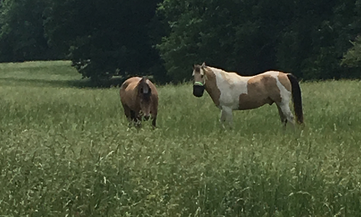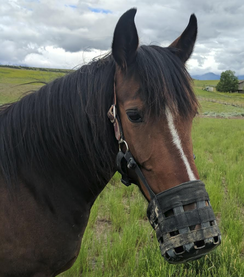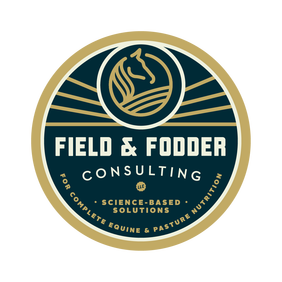 By Emily Meccage, PhD In this four part blog series, we are going to be discussing various methods of restricting or prolonging forage consumption in your horses, as well as how to measure your horse’s body condition. In recent years, the number of overweight and obese horses has increased. Grazing muzzles have been widely promoted in the horse world to allow horses access to pasture and socialization while decreasing caloric consumption. But how well do they work? The first published studies evaluating effectiveness were performed in the UK. These projects found an 80-83% reduction in intake when the muzzles were used. They measured intake by collecting urine and feces and “back-calculating” caloric output and intake. In a study that I conducted with my advisers at University of Minnesota, we measured intake restriction by measuring grass production directly. We also wanted to see if grass morphology, or structure, affected intake with the grazing muzzle. Overall, no matter what grass species was grazed, effectiveness appeared to be similar.  Overall, we are finding that muzzles work. But you can’t just rely on a grazing muzzle to fix everything. It is not recommended to use a muzzle 24/7. Maximum recommendations are 10-12 hours, with close monitoring of welfare as well as how it’s working. Rubbing can occur around the face, as well as some issues with dentition, particularly if pastures are short. When the grazing muzzle is not on, make sure to still employ other methods for weight loss. Some of which will be discussed in our future posts. One study did find that when a grazing muzzle was used for 10 hours, then horses were allowed to graze without a muzzle for 14 hours, they still lost weight over a 3-week period. However, for the most effective weight loss, coupling muzzles with other methods such as slow feed hay nets and balanced rations will be the most effective. And of course, making sure your horse gets proper exercise. In order to be able to monitor effectiveness, body condition scoring is the most helpful if you don’t have access to a scale. Follow us for the next part of our series where we will be discussing how to body condition score your horse, and what it can tell you!
1 Comment
|
Archives
July 2018
Categories |

 RSS Feed
RSS Feed